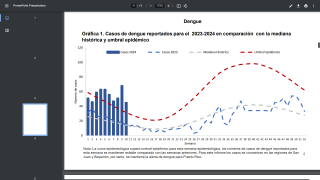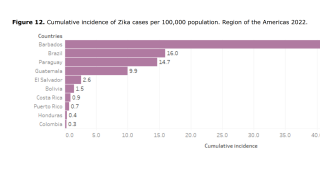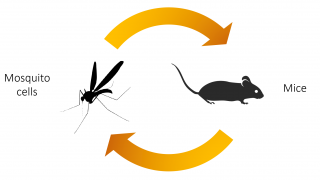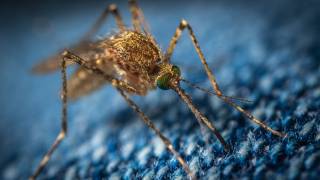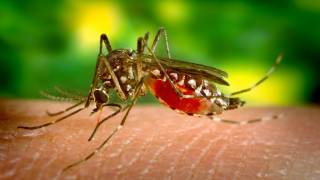Cuba Visitors Returned With the Zika Virus

A recent study found travelers returning to Spain after visiting Cuba in 2017 were carrying the Zika virus.
According to a study led by the Hospital Clínic of Barcelona and the Barcelona Institute for Global Health (ISGlobal), over 3 years, the Tropical Medicine Service Clinic in Barcelona, Spain, detected 42 imported cases of the Zika virus in travelers to Cuba.
While travelers had visited different countries in Latin America and the Caribbean, the Zika cases were only identified in those who visited Cuba, said these researchers in a press release.
“These cases could reflect an absence of herd immunity in the Cuban population, as well as the possibility of it being one of the last places in the Americas with ongoing Zika virus transmission,” explains Alex Almuedo, M.D., first author of this study.
Additionally, Jose Muñoz, study coordinator, ISGlobal researcher and Head of the Tropical Medicine Service at the Hospital Clínic, said ‘these results underscore the need to consider possible Zika infection among travelers returning from Cuba.”
“It is also important to note that 70% of the travelers that got infected with Zika did not seek advice before their trip,” adds Muñoz, highlighting that the imported diseases clinics are “a key element to survey and prevent the introduction of these diseases in non-endemic regions.”
This is important news, since the Caribbean island of Cuba received a record 4.75 million international visitors in 2018, with Canada and the United States the leading arrival markets, reported the Miami Herald.
There is currently no evidence of an ongoing Zika virus outbreak by Cuba.
However, there is limited information available and there may be delays in detecting and reporting new cases, said the International Association of Medical Assistance Medicine on July 10, 2019.
Spain is not the only country reporting Zika virus disease cases.
As of July 2, 2019, a total of 87 countries and territories have had evidence of autochthonous mosquito-borne transmission of the Zika virus (ZIKV), reported the World Health Organization (WHO).
During February 2019, the WHO downgraded The Bahamas from a Category 2 to a Category 3 on its Zika Virus Classification Table.
But, UK health authorities have a different perspective.
The UK classified the Bahamas as having a risk of Zika virus transmission on July 2, 2019. National Travel Health Network and Centre website.
In the USA, the Centers for Disease Control and Prevention (CDC) and the states of Florida (26), California (21), Utah (1) and Nebraska (1) have reported 49 travel-related Zika cases this year, as of July 16, 2019.
Additionally, the US Territory of Puerto Rico has confirmed 22 Zika cases during 2019. These new Zika cases were acquired through the presumed local, mosquito-borne transmission during 2019.
The CDC says ‘Zika continues to be a problem in many parts of the world. Your decision to delay or cancel travel is personal and complex. In making this decision, consider your travel destination and your ability to protect yourself from mosquito bites.’
The Zika virus is spread to people primarily through the bite of an infected Aedes species mosquito. These are the same mosquitoes that spread dengue and chikungunya viruses, says the CDC.
Various health agencies continue to recommend pregnant women and those considering pregnancy, avoid traveling to Zika endemic countries, such as Puerto Rico.
The CDC recommends that pregnant women and couples planning a pregnancy within the next 3 months consult with a health care provider in making this decision. And, these women should refrain from sexual contact with a Zika-infected person.
This is important advice since a recent study found pregnant women who become infected with Zika early in pregnancy were 17 times more likely to deliver a baby suffering from Microcephaly, and other negative health conditions.
Zika virus news
- 49 Zika Cases Returned to America in 2019
- Zika Remains a Worldwide Health Risk to Pregnant Women
- Zika Exposure While Pregnant Associated with Microcephaly
- US Government Makes 2nd Zika Investment
- New Legislation May Protect the USA From Zika
- Where Are Californians Acquiring the Zika Virus?
Anyone who has not already been infected with the Zika virus can get it. Once a person has been infected, they are likely to be protected from future infections, says the CDC.
To assist healthcare providers to better diagnose these diseases, the CDC recently published a report during June 2019, that summarizes existing and new guidance on Zika virus diagnostic testing.
Zika vaccines
Researchers around the world are trying to develop Zika vaccines using different development platforms. These Zika vaccine candidates include, but are not limited to, the following list:
These vaccine candidates remain in clinical studies and will take more time before they become available to the public.
Our Trust Standards: Medical Advisory Committee


